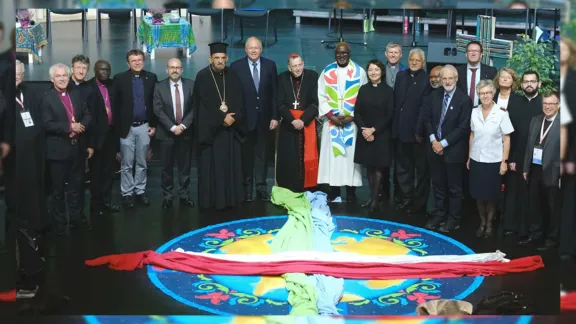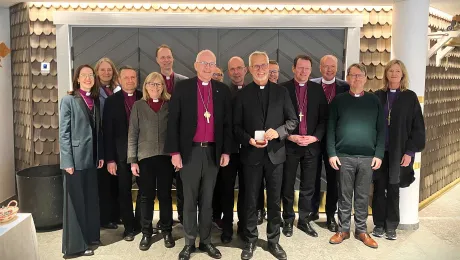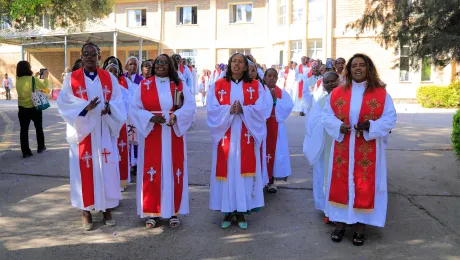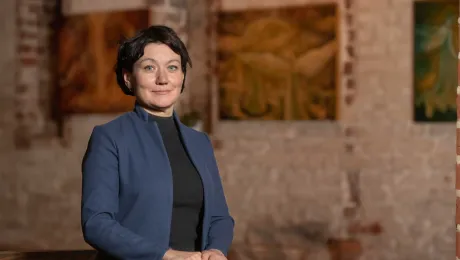As the annual Week of Prayer for Christian Unity draws to a close, we look ahead to some of the highlights and hopes for the ecumenical agenda over the coming year

LWF leaders with the ecumenical guests taking part in a panel discussion on the closing day of the LWF Thirteenth Assembly in Krakow, Poland. Photo: LWF/M. Renaux
Building communion among Christians in preparation for the 500th anniversary of the Augsburg Confession
(LWI) - As Lutherans worldwide look ahead to the 500th anniversary of the Augsburg Confession in 2030, they are called to recognize “the inherently ecumenical nature of their Christian witness.” During the annual Week of Prayer for Christian Unity, the Lutheran World Federation (LWF) Assistant General Secretary for Ecumenical Relations, Prof. Dr Dirk Lange shared reflections on some highlights for the coming year.
Lange noted that the LWF Assembly, which convened in Krakow, Poland, last September, called on the LWF “to prepare for the commemoration of the 500th anniversary of the Augsburg Confession in conversation with ecumenical partners.” Lange recalled that the primary confession of faith for all Lutheran churches was originally presented as an ecumenical confession at the Diet of Augsburg to restore religious and political unity within the 16th century church.
The Augsburg Confession, Lange said, “calls us first and foremost to proclaim the gospel, which is God’s unconditional promise to the whole created order.” LWF’s ecumenical work, he added, “seeks to build communion with our partners, living into God’s promise which is abundant life for all.”
Theological dialogues and practical partnerships
An important moment on the ecumenical calendar will be a final meeting next month of a preparatory group which is working on launching the sixth phase of the International Lutheran-Catholic Joint Commission on Unity. Lutheran-Catholic relations will also be in focus when ecumenical representatives take part in the second session of the worldwide Synod of Bishops of the Roman Catholic church in October.
Relations with the Orthodox church remain high on the agenda this year with a plenary meeting in Cairo, Egypt, in May of the Joint International Commission on Theological Dialogue between the LWF and the Orthodox Church. Participants will be preparing a shared statement to mark the 1700th anniversary of the Council of Nicaea, an important milestone on the ecumenical calendar for all Christians in 2025.
Over the coming weeks, the focus will be on strengthening relations with Anglican churches around the world as the Anglican–Lutheran International Commission on Unity and Mission (ALICUM) holds a second meeting. Pairs of bishops from different countries will be tasked with discerning ways of cooperating more closely together to put into practice the theological agreements that have been reached between the two communions.
Strengthening bilateral and multilateral relationships
Relations with Pentecostals will be under the spotlight again this year as discussions take place about the launch of a new phase of dialogue, following the conclusion and publication of a report on the first phase in 2023. Alongside these bilateral conversations with ecumenical partners, 2024 will also see some key multilateral gatherings such as the Global Christian Forum, which meets in Ghana this year and the conference of secretaries from the Christian World Communions which will take place in Kenya in the autumn.
The LWF will be present with Methodists at their 22nd World Methodist Conference taking place in Gothenburg, Sweden, in August. That same month, LWF will also take part in the General Assembly of the Communion of Protestant Churches in Europe in Romania. A new ecumenical event will take place in Assisi, hometown of Saint Francis, to discuss the theological and liturgical impact of the Seasons of Creation initiative, based on Pope Francis’ Laudato Si’ encyclical.
“Ecumenism is at the heart of life,” Lange noted, “and it is therefore at the heart of the work of our Communion Office as it supports the mission and witness of our member churches.” Part of LWF’s ecumenical relations work is therefore “the reception process of ecumenical study documents” in order to integrate them into the life of the local churches. “May our preparations for the Augsburg anniversary,” he concluded, “strengthen our commitment to rediscovering that unity which God wills for the church.


